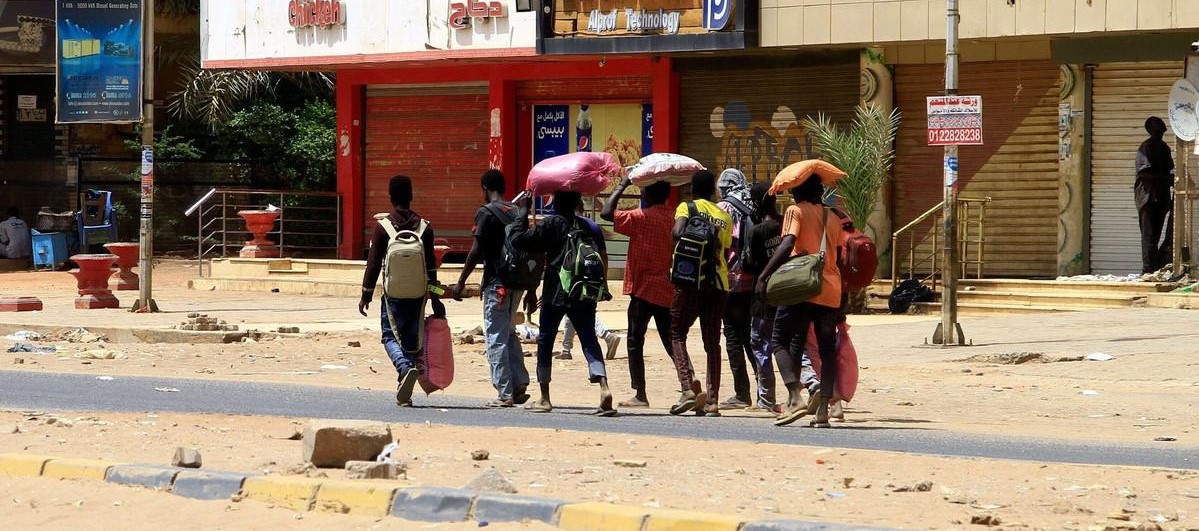Confrontations between security forces continue in Sudan as citizens attempt to escape
April 20, 2023
The bloody confrontations between the Sudanese Armed Forces (SAF) and the Rapid Support Forces (RSF) continue for the sixth day, amid a military build-up from both sides on the outskirts of the capital. Many international and local appeals for the warring generals to stop the violence fell on deaf ears, as two previous attempts for a truce failed, with no end in sight for the street war ongoing inside civilian neighborhoods.
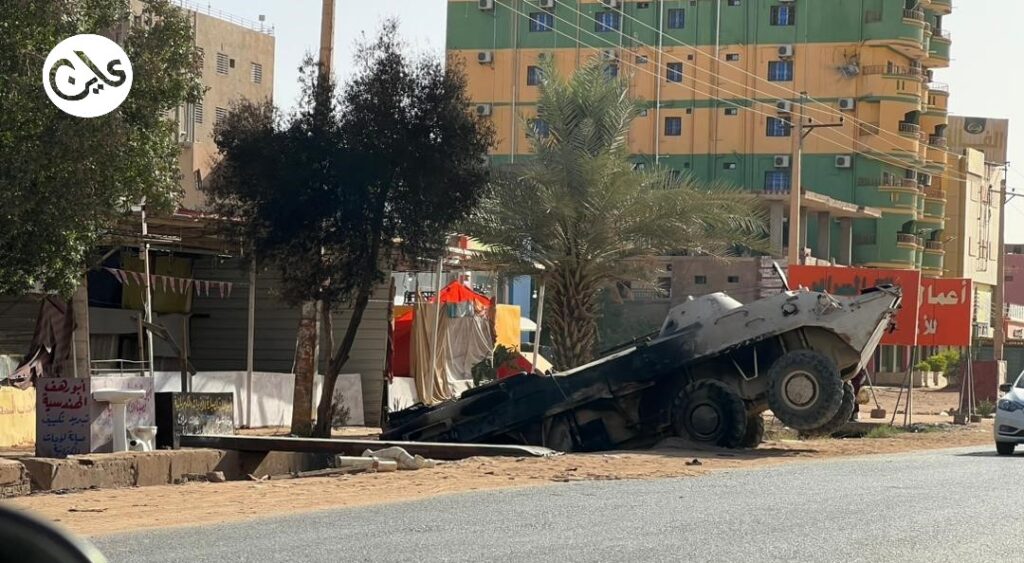
Fighting continues in Khartoum, Omdurman
While certain restive areas experienced calm today, fighting intensified in other areas, such as north and west Omdurman, the capital’s sister city. With an already dire humanitarian situation in the capital, Khartoum, civilians have braved the gunfire on the streets and started a mass migration out of the city towards other states.
The two warring parties agreed on a second ceasefire on Wednesday for 24 hours in response to international and local appeals for humanitarian purposes, yet both parties did not commit to the truce, and the hopes of a ceasefire were lost within the first hour as heavy gunfire continued.
Armed clashes took place this morning, Thursday, in the northern and western parts of the city of Omdurman, after the Sudanese army confronted forces from RSF, which were coming via the Al-Tahadi and Al-Sadarat roads. Eyewitnesses reported to Ayin that clashes on the Bara-Omdurman road left three civilians dead and four wounded when bombs fell on their home in Al-Muwaileh housing square. Hundreds of residents fled towards the north of the city while crowds of RSF troops remain stationed in this area, suggesting further conflict could flare up at any time.
“The explosion of violence in Sudan has the potential to plunge millions more into hunger”, warns the United Nations World Food Programme (WFP), which had to call a temporary halt to operations on Sunday after three of its employees were killed in the ongoing clashes, two others sustained severe injuries, and their offices, equipment, and supplies were damaged.
The health sector situation in the country continues to deteriorate due to the ongoing attacks, “Thirty-nine hospitals are out of service, nine of which were shelled, and 16 were forcibly evacuated. Out of 59 main hospitals across the country, only 20 are operative – either fully or partially – and they are subject to closure due to the lack of staff, medical supplies, water, and electricity,” stated the Doctor’s Central Committee yesterday, adding that 5 ambulances were attacked by the warring forces.
Over 330 people were killed and nearly 3200 are injured, according to Tedros Adhanom Ghebreyesus, Director-General of the World Health Organization, among them, at least nine children and more than 50 children have reportedly been injured, UNICEF stated.
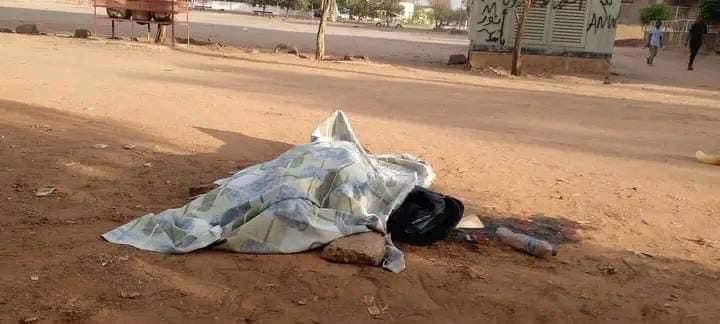
Corpses on the Street
The number of victims is likely far greater, as there are corpses scattered on the streets unaccounted for. Several dead bodies can be seen along the main roads in the center of Khartoum, according to eyewitnesses.
Witnesses reported that the national road from the junction of Block 13, Sharq el Nil to Al Aylafun was filled with burnt and destroyed military vehicles, and corpses out in the open. They also saw members of the Rapid Support Forces at checkpoints inspecting the passing vehicles.
According to eyewitnesses, dozens of corpses have also accumulated in the Al-Manara neighbourhood in northern Omdurman. Several RSF corpses were also seen today in the Khaled Ibn-Walid camp, north of Omdurman, yet to be buried.
On Wednesday, the Sudanese Ministry of Interior announced the formation of an emergency room designated to rescue the wounded and evacuate the bodies from the streets to place them in morgues within the capital.
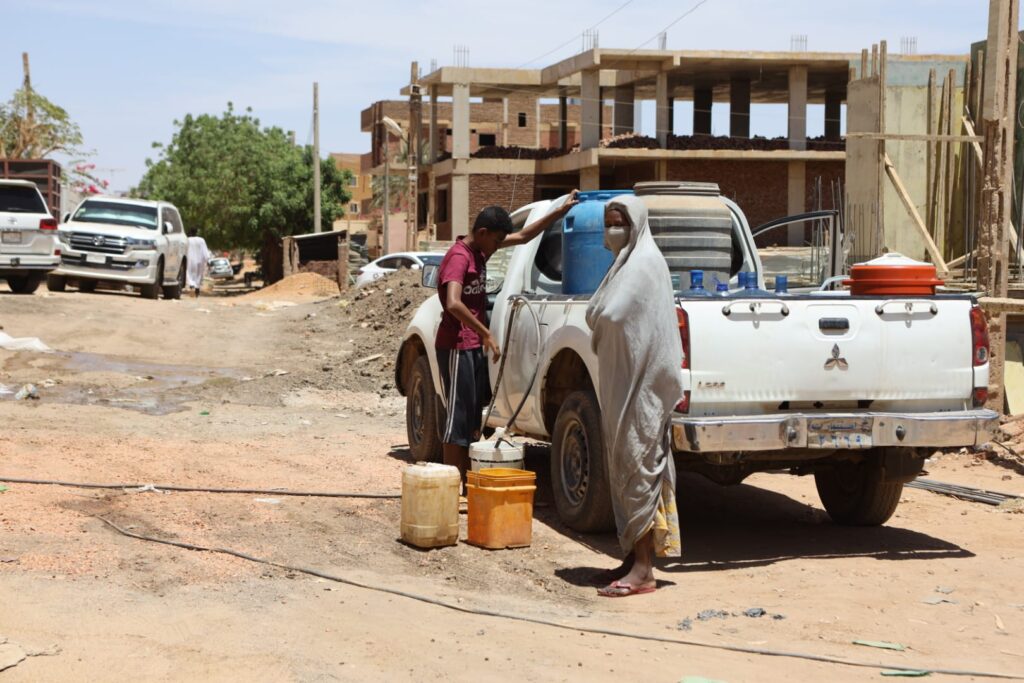
Dire conditions for citizens
The armed conflict continues in the surroundings of the Army’s General Command, with an increasing number of RSF deployed in central Khartoum, the airport area, Khartoum 2, and Burri neighborhoods. SAF meanwhile takes over the northern part of its General Command facility, up to the University of Khartoum, in addition to Jackson bus station in front of the White Nile bridge “Al Fitehab”, according to witnesses’ testimonies.
Residents of areas near the army command live in a state of panic, as their homes are continuously bombarded with shells and random gunfire. According to one of the witnesses, hundreds of families had to flee the clashes in Al-Daim, Khartoum, to the neighbourhoods south of the capital, such as Jabra and other areas that are relatively safe.
Access to food, water, and electricity continues to pose a problem since Saturday for Khartoum residents. Due to short supplies, a barrel of water is now a hot commodity, costing 15,000 Sudanese Pounds (roughly US$25) in the Kadru area, north of the capital. While power blackouts continue in most parts of the capital.
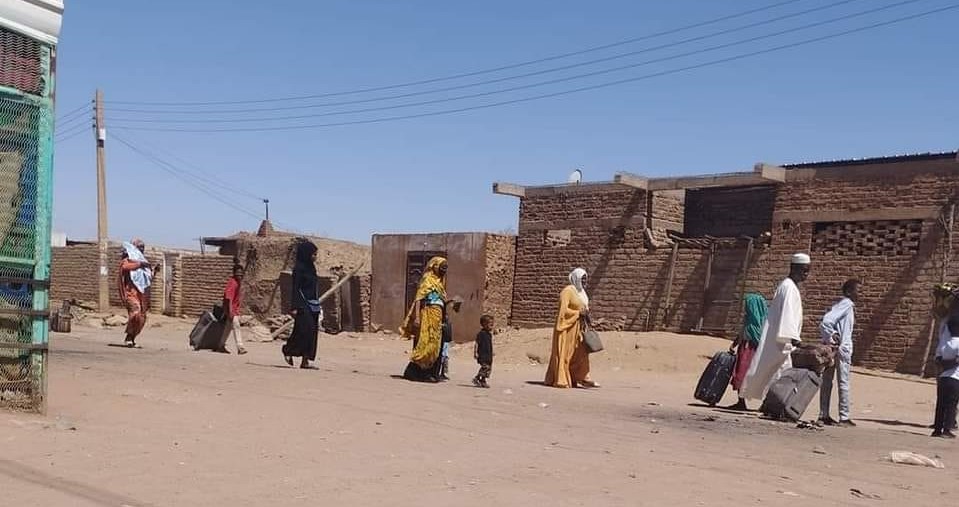
Major Displacement
Thousands of families began escaping Khartoum by land to various Sudanese states, especially the central region and north of the country. According to witnesses, the land port south of the capital, Al Souq Al Shaabi in Omdurman, and several transportation stations were filled with passengers, amid a skyrocketing rise in ticket prices.
Eyewitnesses also reported a cautious movement of citizens along the main streets of Khartoum, including Obaid Khatim and Africa Street as well as Al-Sahafa Zalat Street, heading towards the land port to leave Khartoum.
An Ayin correspondent described the tragic scene of Sudanese as they ventured on their feet, carrying cloth bags on their heads, holding their young close, and others on vehicles, making their way under the thunder of artillery fire, praying to reach the land port – the largest station for internal travel in the capital, located south of the city of Khartoum.
“Once you go south from Khartoum and enter the borders of Al-Jazeera state, you will find RSF taking full control of the checkpoints they set up. They have seized buildings and houses along the road from the Sports City to the Al Bagair area south of the capital, and used them as a headquarters,” the correspondent said. “In front of the houses usurped by RSF, a variety of cars with different types of weapons on them are parked. I also saw other brown vehicles with artillery on them, that look similar to the ones we used to see in the Libyan war,” he added.
The correspondent stated that he did not notice any presence of the SAF along the road from Khartoum to Al-Bagair, noting that it seems that the RSF seized the army’s first infantry division. “We also found the main crossing point between Khartoum and Al-Jazeera states destroyed, looted, and about eight tanks burnt. Perhaps the army bombed it with planes after losing it in the battle.”
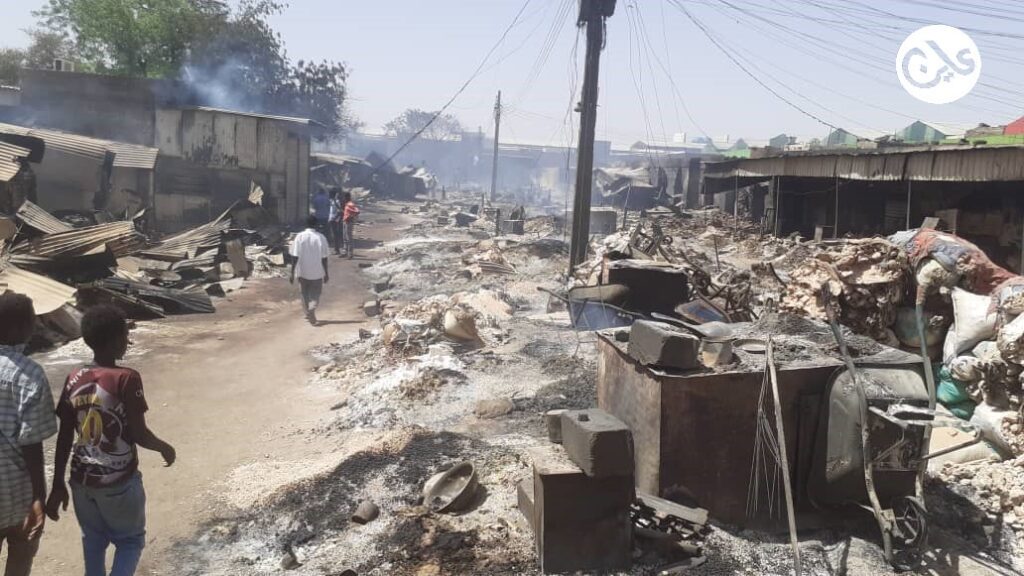
Darfur cities
Major cities in Darfur are similarly affected by the violence. An Ayin correspondent from Nyala, South Darfur State, reported that most of the city neighbourhoods suffer from water shortages, electricity outages, and depleted food supplies, especially flour, sugar, and vegetables, as interstate transportation stopped due to the closure of roads and scarcity of fuel. In other cases, there is simply no place to purchase basic necessities. An eyewitness in Nyala said the markets were set on fire during the attacks between the two warring parties.
All private sector hospitals and health centers were closed, except for Nyala Teaching Hospital, Police Hospital, and the Medical Corps, yet these facilities suffer a shortage of medical personnel and a scarcity of emergency and vital medicines, according to the Director General of the Ministry of Health in South Darfur State, Dr. Rehab Alqam. At least 31 people have died in Nyala and 300 injured, according to the state’s health ministry.
Citizens of El-Fasher, North Darfur State are also in a grave humanitarian situation, according to medical sources. El Fasher Hospital was filled with sick and wounded people, amid an acute shortage of medical personnel and medicines.


